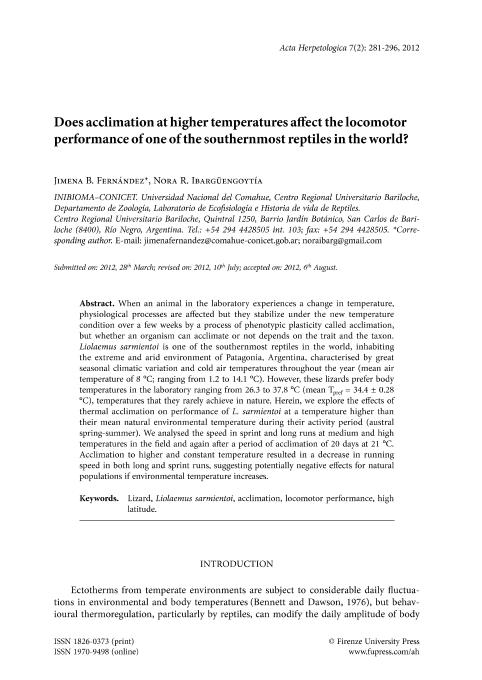Artículo
Does acclimation at higher temperatures affect the locomotor performance of one of the southernmost reptiles in the world?
Fecha de publicación:
12/2012
Editorial:
Firenze University Press
Revista:
Acta Herpetologica
ISSN:
1827-9635
e-ISSN:
1827-9643
Idioma:
Inglés
Tipo de recurso:
Artículo publicado
Clasificación temática:
Resumen
When an animal in the laboratory experiences a change in temperature, physiological processes are affected but they stabilize under the new temperature condition over a few weeks by a process of phenotypic plasticity called acclimation, but whether an organism can acclimate or not depends on the trait and the taxon. Liolaemus sarmientoi is one of the southernmost reptiles in the world, inhabiting the extreme and arid environment of Patagonia, Argentina, characterised by great seasonal climatic variation and cold air temperatures throughout the year (mean air temperature of 8 ºC; ranging from 1.2 to 14.1 ºC). However, these lizards prefer body temperatures in the laboratory ranging from 26.3 to 37.8 ºC (mean Tpref = 34.4 ºC ± 0.28), temperatures that they rarely achieve in nature. Herein, we explore the effects of thermal acclimation on performance of L. sarmientoi at a temperature higher than their mean natural environmental temperature during their activity period (austral spring-summer). We analysed the speed in sprint and long runs at medium and high temperatures in the field and again after a period of acclimation of 20 days at 21 ºC. Acclimation to higher and constant temperature resulted in a decrease in running speed in both long and sprint runs, suggesting potentially negative effects for natural populations if environmental temperature increases.
Palabras clave:
Liolaemus Sarmientoi
,
Acclimation
,
Locomotor Performance
,
High Latitude
Archivos asociados
Licencia
Identificadores
Colecciones
Articulos(INIBIOMA)
Articulos de INST. DE INVEST.EN BIODIVERSIDAD Y MEDIOAMBIENTE
Articulos de INST. DE INVEST.EN BIODIVERSIDAD Y MEDIOAMBIENTE
Citación
Fernandez, Jimena Beatriz; Ibarguengoytía, Nora; Does acclimation at higher temperatures affect the locomotor performance of one of the southernmost reptiles in the world?; Firenze University Press; Acta Herpetologica; 7; 2; 12-2012; 281-296
Compartir
Altmétricas




